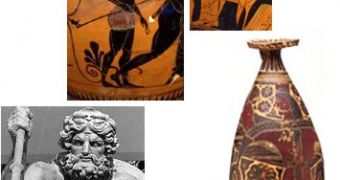We look at the Middle Ages and we tend to think that precarious hygiene and "skunk" scent characterized the human kind till relatively recent times.
Wrong.
A new exhibition in Rome reveals to us how people during the Bronze Age employed refined and sophisticated perfumes, typically a mix of natural spices and olive oil. The exhibition also displays artifacts from the oldest known perfume factory.
There are four perfumes recreated by a team of archaeologists from 14 original fragrances dated from 4,000 years ago and whose formula was detected after digging at the Pyrgos-Mavroraki site in Cyprus.
The site proved in 2003 to harbor a complex thought to have been employed as a perfume lab. "The archaeologists used fragrances extracted from traces left in containers at the site to recreate ancient aromas with the same techniques used in the past," said Maria Rosaria Belgiorno, the leading archaeologist.
"Today, we are used to chemical and alcoholic scents, but these are fresher ones, smelling of herbs and spices, like almond, coriander, myrtle, conifer resin, bergamot - and not flowers,'' said Belgiorno, who is also the curator of the exhibit at Rome's Capitoline Museums.
"The perfumes were made through the lengthy steeping of the spices in water and oil and other ancient techniques".
The perfumes were baptized after the Greek goddesses Hera, Athena, Aphrodite and Artemis and are exposed behind glass, with a lid that visitors can lift up to sniff the fragrances.
There are also another 60 items, including amphorae, jugs, grinders and distilling equipment, coming from the site located 60 miles (100 km) southwest of Nicosia. "While perfumes and ointments have been found in tombs in Egypt and Mesopotamia, this was a rare case where an entire factory dedicated to making perfume was found," said Belgiorno.
"The 42,300-square-foot lab, believed to have been destroyed in an earthquake in antiquity, is exceptionally well-preserved and shows that making perfume was a serious business. The 2000 B.C. complex included an olive press room, areas dedicated to the working and refining of copper, and five 106- to 132-gallon oil-storage containers. It employed dozens of people," she added.
It is thought that during the Bronze Age and until the 1st millennium B.C., Cyprus was a main player in copper and olive oil production and trade. Olive oil was employed - besides in alimentation - in medicine, cosmetics and perfume, many being exported to mainland Greece.

 14 DAY TRIAL //
14 DAY TRIAL //